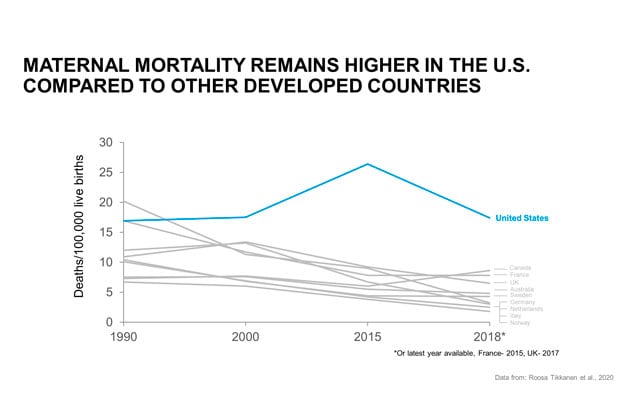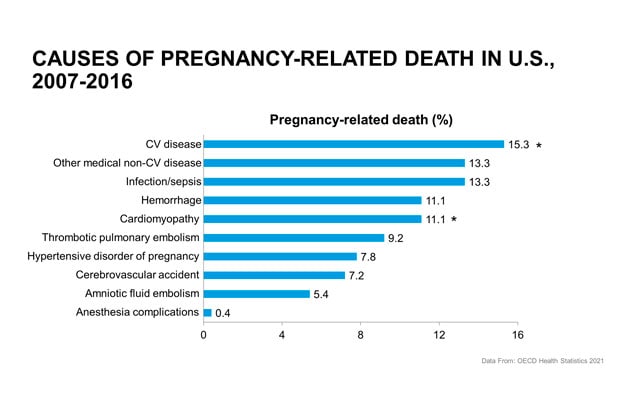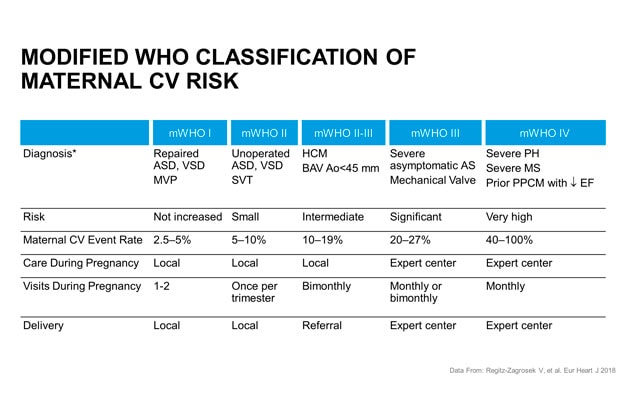July 01, 2022
Women with cardiovascular disease in pregnancy receive care from Mayo Clinic's multidisciplinary pregnancy heart team
美国孕产妇死亡率。

美国孕产妇死亡率。
相较于其他发达国家,美国的孕产妇死亡率仍然较高。
美国妊娠相关死亡的原因

美国妊娠相关死亡的原因
心血管疾病被列为 2007 年至 2016 年美国妊娠相关死亡的最常见原因。
Cardiovascular disease is the leading cause of maternal mortality in the United States. Among developed countries, the United States has the highest maternal mortality rate by over twofold (20.1 deaths per 100,000 live births in 2019).
Non-Hispanic Black women have the highest maternal mortality rate (44.0 deaths per 100,000 live births), and women age 40 and over have a maternal mortality rate that is six times higher than the rate for women under the age of 25. In addition, adverse pregnancy outcomes, such as hypertensive disorders of pregnancy, gestational diabetes and preterm delivery, are associated with an increased risk of developing subsequent cardiovascular disease.
Pregnancy presents a stress to the cardiovascular system. Many physiological and hemodynamic changes occur to support the increased metabolic demands of pregnancy. Additional hemodynamic changes occur following delivery and in the early postpartum time frame. Knowledge of these changes is imperative, particularly in the management of pregnancies in women with cardiovascular disease.
Cardio-obstetrics is an emerging field within cardiology that focuses on the appropriate management of cardiovascular disease in pregnancy, including preconception counseling and postpartum follow-up. While this model of care traditionally targets women with congenital heart disease, it has progressed to include those with acquired cardiovascular disease and cardiovascular disease risk factors, such as hypertension and diabetes. Frequently encountered acquired cardiovascular diseases in pregnancy include heart failure (including peripartum cardiomyopathy), myocardial infarction, arrhythmias and aortopathies.
世界卫生组织孕产妇心血管疾病风险分类修订版

世界卫生组织孕产妇心血管疾病风险分类修订版
在孕期出现中高度风险类别心脏并发症的女性需要进行孕前咨询和监测。
"The risks of pregnancy for women with cardiovascular disease are related not only to their underlying cardiac disease but also to their functional status and comorbidities," says Kathleen (Katie) A. Young, M.D., a Mayo Clinic cardiologist in Rochester, Minnesota. "Women deemed to be at moderate or high risk for cardiac complications during pregnancy — commonly defined as modified World Health Organization categories 2 to 3, 3, and 4 — require pre-pregnancy counseling, monitoring during pregnancy and delivery by a multidisciplinary pregnancy heart team at an expert center," says Dr. Young.
At a minimum, the pregnancy heart team should include a cardiologist, an obstetrician and maternal and fetal medicine provider, an obstetric anesthesiologist, and a registered nurse-nurse practitioner physician assistant, all with expertise managing high-risk pregnancies in women with heart disease. Additional expert involvement depends on the patient and the disorder. These may include experts in cardiac imaging, heart rhythm, heart failure, coronary artery disease and spontaneous coronary artery disease, systemic hypertension, pulmonary hypertension, interventional cardiology, cardiothoracic surgery, genetics, pediatric cardiology, fetal medicine, neonatology, social work, and others as appropriate.
At Mayo Clinic, care for women with cardiovascular disease in pregnancy is performed by a multidisciplinary pregnancy heart team through the Cardiovascular Obstetrics (CVOB) Clinic.
The CVOB clinic offers comprehensive care, including preconception counseling, monitoring through pregnancy and delivery, and postpartum follow-up and risk factor assessment for women with all types of cardiovascular disease. The clinic aims to see patients in conjunction with Obstetrics and Gynecology and Maternal and Fetal Medicine when feasible. Patients may be seen in person in Rochester, Minnesota, or virtually, when appropriate.
For more information
Mayo Clinic Cardiovascular Diseases
Refer a patient to Mayo Clinic.